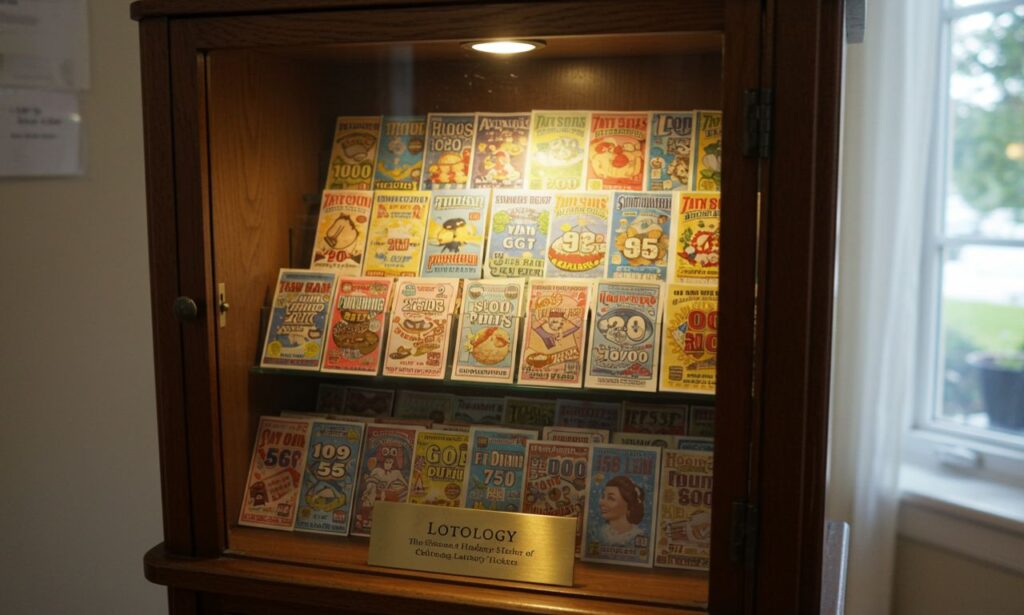Hobbies have always been an essential part of human culture. From stamp collecting to numismatics, people preserve objects that hold historical, cultural, or artistic value. Among these lesser-known yet equally intriguing hobbies is Lotology, the collection and study of lottery tickets.
Though lottery tickets are often discarded after a draw, Lotologists see them as cultural artifacts, representing design, chance, and human hope. Much like stamps or coins, lottery tickets carry stories—about the people who bought them, the times they were printed in, and the dreams they symbolized.
In this article, we’ll dive deep into Lotology: its definition, origins, importance, and future in an increasingly digital world.
What is Lotology?
Lotology is the specialized hobby of collecting and studying lottery tickets.
-
Practitioners are known as Lotologists.
-
Collections may include both used and unused tickets, scratch-offs, draw tickets, or rare historical editions.
-
Some Lotologists collect tickets based on geography, while others focus on artwork, themes, or unique printing errors.
At its core, Lotology celebrates the intersection of chance, culture, and design.
The Origins of Lotology
Lotteries have existed for centuries.
-
The first recorded lotteries took place in 15th-century Europe, where tickets were sold to fund public works.
-
Over time, lotteries spread across the globe, becoming national traditions.
-
By the 20th century, colorful lottery tickets were mass-produced, making them attractive to collectors.
Just as philately (stamp collecting) and numismatics (coin collecting) gained popularity, Lotology emerged as a niche hobby. Enthusiasts realized that lottery tickets weren’t just tools for gambling—they were snapshots of history and creativity.
Why Do People Collect Lottery Tickets?
1. Historical Significance
Old tickets reflect the economic, cultural, and social trends of their times. For example, early lottery tickets often feature coats of arms, government seals, or patriotic imagery.
2. Art and Design
Modern lottery tickets are known for their colorful graphics, intricate illustrations, and creative themes. Many are miniature works of art, designed to attract players.
3. Cultural Curiosity
Tickets vary greatly from one country to another. A ticket from Japan may feature traditional motifs, while one from the U.S. might celebrate sports or holidays. Collectors enjoy comparing these differences.
4. Nostalgia
For many Lotologists, tickets are tied to memories—buying a first ticket, a big jackpot draw, or even family traditions.
5. Rarity and Value
Like stamps and coins, rare tickets or discontinued editions become valuable collectibles. Some are sold at auctions to dedicated enthusiasts.
Lotology vs Other Collecting Hobbies
Lotology shares similarities with other collecting hobbies but has unique characteristics:
| Hobby | Object Collected | Significance | Unique Factor |
|---|---|---|---|
| Philately | Stamps | Postal history, art, geography | Longevity & global recognition |
| Numismatics | Coins/Currency | Economy, trade, national identity | Precious metals & rarity |
| Lotology | Lottery Tickets | Culture, art, psychology of chance | Represents dreams & hope |
Unlike stamps and coins, lottery tickets symbolize risk, luck, and aspiration, giving Lotology a distinctive emotional appeal.
Types of Lottery Tickets Collected
1. Scratch-off Tickets
-
Popular for their bright colors and varied designs.
-
Themes often include holidays, pop culture, or special events.
2. Draw Tickets
-
Traditional printed tickets used for weekly or national draws.
-
Often feature serial numbers and security markings.
3. Commemorative Editions
-
Issued for special occasions, anniversaries, or national events.
-
Highly sought-after by collectors.
4. International Tickets
-
Tickets from different countries highlight cultural diversity.
-
Lotologists often exchange tickets globally to enrich collections.
5. Rare or Historical Tickets
-
Discontinued lotteries or vintage tickets from the 19th and early 20th centuries are especially valuable.
The Psychology of Lotology
Lottery tickets are unique collectibles because they carry a psychological dimension.
-
Hope and Dreams – Every ticket represents the possibility of life-changing luck.
-
Human Fascination with Chance – Lotology reflects our attraction to uncertainty and fortune.
-
Storytelling – Collectors often wonder about the lives of people who once held those tickets—what dreams they carried, and whether they won.
Thus, Lotology combines both tangible value (design, rarity) and intangible meaning (hope, luck, nostalgia).
Modern Lotology Communities
Thanks to the internet, Lotologists can now connect worldwide. Some popular avenues include:
-
Online forums and clubs dedicated to lottery ticket collectors.
-
Social media groups where enthusiasts share pictures and stories.
-
Auction platforms like eBay, where rare tickets are traded.
Communities also organize meet-ups, exhibitions, and collector fairs, allowing Lotologists to exchange, display, and preserve tickets.
Challenges in Lotology
-
Preservation Issues
-
Tickets are printed on thin, fragile paper prone to fading and tearing.
-
Special albums or plastic covers are required for storage.
-
-
Authenticity Concerns
-
Older or rare tickets can be counterfeited. Collectors must verify sources.
-
-
Rarity and Availability
-
Discontinued lotteries or regional tickets can be difficult to obtain.
-
-
Lack of Recognition
-
Compared to stamp or coin collecting, Lotology remains niche, with fewer resources and guides available.
-
The Future of Lotology
One of the biggest questions Lotology faces is the rise of digital lottery systems. With e-tickets becoming common, physical lottery tickets may eventually disappear.
However, this shift might actually increase the value of existing tickets:
-
Physical tickets will become rarer artifacts.
-
Vintage tickets may gain greater historical and financial value.
-
Lotology could evolve into a mix of physical and digital collectibles, with NFTs (non-fungible tokens) representing lottery history.
Collectors argue that the charm of holding a tangible ticket—an object once tied to dreams—is irreplaceable.
Tips for Starting Lotology as a Hobby
-
Begin Locally – Start by collecting tickets from your local lottery.
-
Focus on Themes – Choose tickets based on events, art, or countries.
-
Use Protective Storage – Store tickets in albums with acid-free sleeves.
-
Join Communities – Connect with other Lotologists online or at collector fairs.
-
Track Rarity – Research discontinued or limited-edition tickets.
Conclusion
Lotology is far more than an unusual hobby—it is a way of preserving history, culture, and human aspiration. Each lottery ticket tells a story of hope, luck, and creativity, making it a fascinating collectible. While still a niche pursuit, Lotology continues to grow, fueled by passionate enthusiasts who see beauty and meaning in what others throw away.
As the world moves toward digital lotteries, Lotology may become even more important in preserving a tangible connection to this universal game of chance. Whether you are a casual hobbyist or a serious collector, Lotology offers a unique blend of art, history, psychology, and human dreams.






